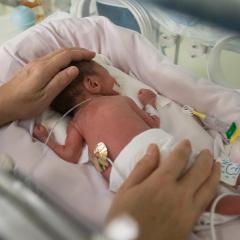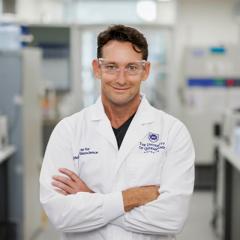University of Queensland-led research into solutions for musculoskeletal conditions such as back pain and osteoarthritis has attracted more than $8 million from the National Health and Medical Research Council (NHMRC).
The research, led by Professor Paul Hodges and Professor Bill Vicenzino from UQ’s School of Health and Rehabilitation Sciences, began in 2010, supported by an initial NHMRC Program Grant of $7.6 million.
The additional $8.3 over five years announced this week means researchers from UQ, the University of Melbourne and the University of Sydney can continue their work on non-surgical solutions for musculoskeletal conditions.
It adds to the $2.5 million the team recently received from the NMHRC to establish the Centre of Research Excellence in Translation of Research into Improved Outcomes in Musculoskeletal Pain and Health.
Professor Hodges said musculoskeletal conditions were one of the most expensive disease groups, and were the leading cause of disability in Australia.
“These conditions are drastically under-investigated relative to other disease groups,” he said.
“The work of this team involves direct translation of research into improved health outcomes and the team is seeking participation by people with musculoskeletal conditions, including low back pain, in the research program.”
UQ research also attracted two NHMRC development grants.
The Institute for Molecular Bioscience’s Professor David Fairlie has been awarded $557,000 over three years to develop new drug treatments for malaria, a disease that kills an estimated 584,000 people worldwide each year.
Professor Fairlie and his team have invented small molecule chemicals that kill malaria parasites without killing healthy human cells, by blocking the action of parasite proteins essential for growth and survival.
Professor Fairlie will work with Dr Kathy Andrews at Griffith University’s Eskites Institute for Drug Discovery and two international industry partners to translate these findings into improved potential antimalarial drug treatments suitable for human clinical trials.
Professor Stuart Crozier, from UQ’s School of Information Technology and Electrical Engineering, was awarded $539,000 over three years for a project to develop magnetic resonance imaging software to examine the health of cartilage tissue in joints.
Industry partner Siemens has contributed $238,000 to the project, with the technology to help physicians develop preventative strategies for osteoarthritis.
Professor Elizabeth Eakin’s project, “Improving retention rates in the Get Healthy Information and Coaching Service”, attracted $284,638 in NHMRC Partnership Project funding.
The project looks at countering the high drop-out rate in health promotion programs, and is a collaboration between UQ, University of Sydney and the New South Wales Ministry of Health.
The NHMRC also provided financial support for the next generation of scientists, funding several post-graduate students at UQ.
UQ Deputy Vice-Chancellor (Research) Professor Robyn Ward congratulated the researchers on their success.
“These projects all focus on translating research into practical and accessible solutions for health issues affecting thousands of Australians,” she said.
“Their findings may well have a lasting impact on the health industry, and I look forward to seeing the outcomes.”
Media: Senior Communications Officer Katie Rowney, 3365 3439, katie.rowney@uq.edu.au.



